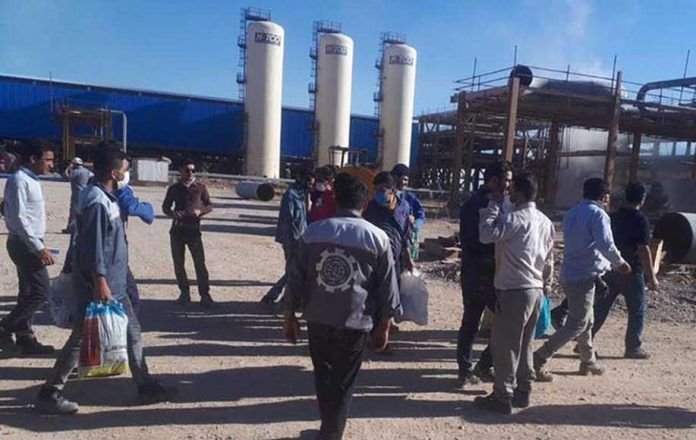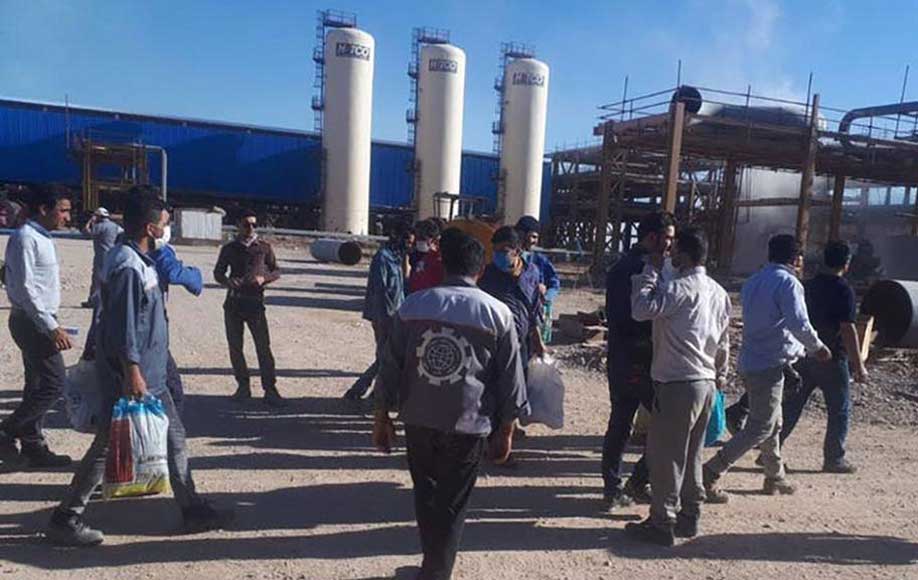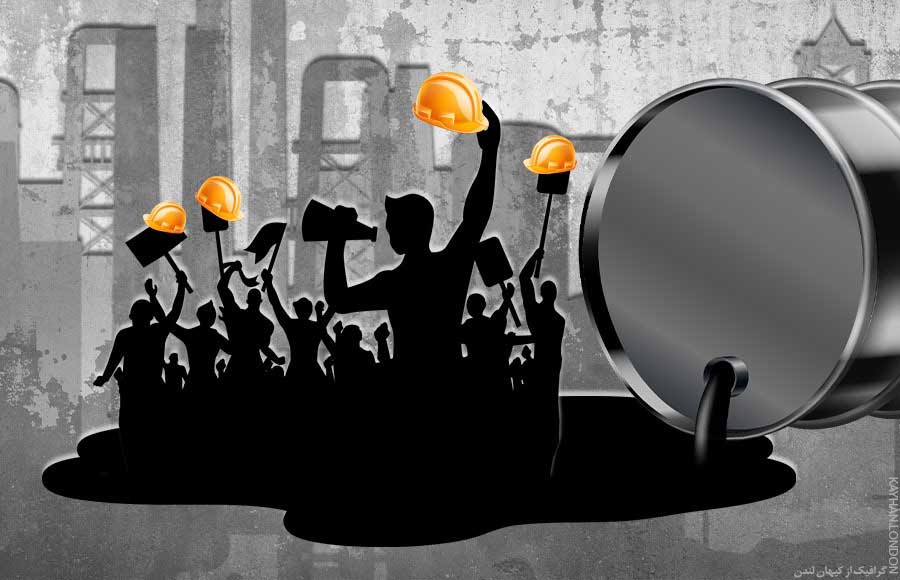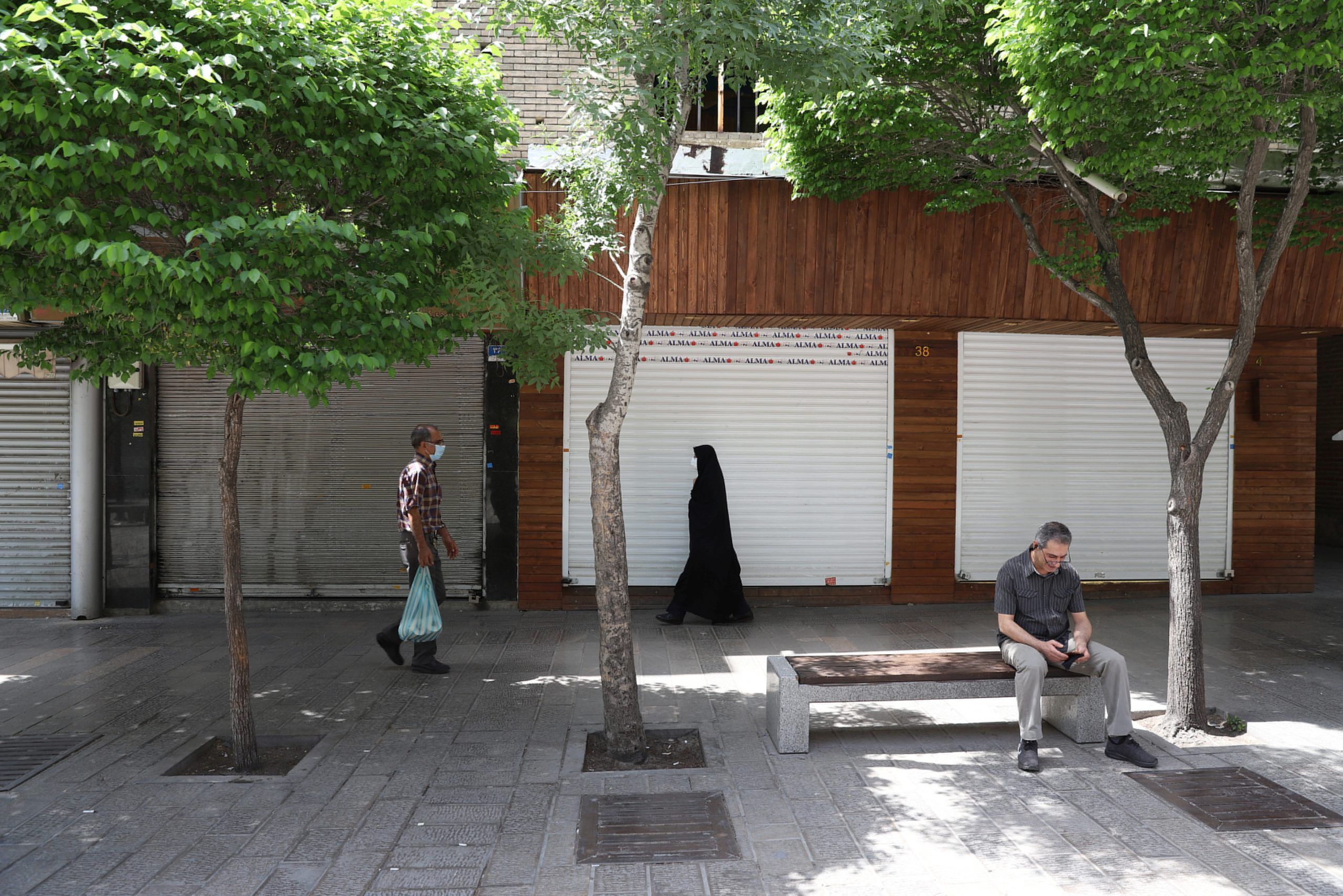A nationwide strike by Iranian oil workers on fixed-term contracts — which started a day after the June 18 Iranian presidential elections — has spread to 80 oil, gas, and petrochemical companies and is entering its third week. It is the most extensive industrial action to date by the country’s oil workers.
Many workers on fixed-term and permanent contracts in other industries and businesses have now joined the industrial action. In addition, many tank truck drivers who provide fuel to refineries have joined the strike; as a result, gas stations around the country have been experiencing a fuel shortage.
Teachers, pensioners, and families who seek justice for their loved ones killed during the nationwide protests in November 2019 have also joined the striking workers.
Despite receiving massive support from domestic and international trade unions, the outgoing President Hassan Rouhani and his oil minister, Bijan Namdar Zanganeh, have ignored the striking workers’ grievances and demands entirely. They have argued that it is not the government’s responsibility to address issues raised by the workers.
The workers demand higher wages, better work conditions, job security, and benefits. Many workers in oil and petrochemical industries on fixed-term contracts get paid much less than their counterparts in other businesses and have received no raise in years.
Kayhan Life recently spoke to several workers about the prominent and less conspicuous issues facing fixed-term contract workers in the oil industry.
One of the principal demands of the oil workers on fixed-term contracts is a wage increase.
Reza, an oil worker on a fixed-term contract, told Kayhan Life: “The Oil Ministry says it is not its responsibility but the contractors who hire us to increase our wages. The contractors operate under the Ministry of Labor and Social Welfare supervision, which uses the minimum wage to calculate our pay.”
“Why should someone who works 12-hour shifts on 20-meter platforms and in unbearably hot temperatures receive only minimum wage?” Reza asked. “Why should someone who works in the most crucial sector of the country’s economy receive only minimum wage? If this is fair, why then a worker on a permanent contract, who performs the same job in the oil industry, should get paid two or three times more than those on fixed contracts and also receive other benefits?”
Reza believes that by subcontracting some work to other companies, the Oil Ministry takes advantage of cheap labor. As a result, many of these companies become permanent organs of the Oil Ministry.
“They give the projects to the contractors, but most of the contracts are just for show,” Reza argued. “The major contractors in the oil industry are always busy in various sectors in Iran. These companies either pay bribes to influential managers to secure plum contracts or have close links to senior state officials. Otherwise, how is it possible that a contractor whose workforce is unhappy and has failed to finish a project on time wins another lucrative contract again in Asalouyeh?”
“No one monitors the Oil Ministry’s operations. No one knows the relationship between the contractors and state officials or how much bribes change hands under the table,” Reza added.
Kayhan Life spoke to Alireza, a welder with more than a decade of experience in his trade, about income inequality and unfair wages. He regretted spending most of his life working in the south.
“Media have described the recent event as the oil workers’ strike. To many people, the word worker means a day laborer with no specific skill who works on construction sites,” Alireza noted. “Welders working in the oil industry like me started and spread the current industrial action. None of us is an unskilled day laborer.”
“I have an associate degree in mechanical engineering and have attended several welding workshops. I worked hard to become a welder,” Alireza explained. “I have suffered many burns and injuries. I currently work outside in temperatures close to 50 degrees Celsius with a welding torch that resembles a miniature sun. However, our supervisors treat us as overpaid unskilled workers.”
“A professional welder earns close to $240 a month,” Alireza said. “He spends close to $50 a month on transportation and other expense because he lives far from home. The rest equals a normal wage that skilled workers earn, working eight hours a day where they live. The same welder can earn three to four times more working in a neighboring country, where living conditions and dormitories are much better than those in Asalouyeh.”
“I regret wasting my youth working on oil projects in the Islamic Republic,” Alireza lamented. “If I had worked in the neighboring countries, my family would live in better conditions now. We stayed and worked in our country, but the Islamic Republic does not appreciate us. They boast about their so-called resilient economy, when in fact, they line their pockets with the fruits of our labor. People are compliant victims who submit to the state silently and do not protest against the injustices they suffer.”
“We get to see our family only four days a month,” Alireza noted. “Many of my fellow workers could not be with their wives when they gave birth to their children. We have not seen our children grow or attend weddings or funerals of our families and friends. Our wives attend many events and celebrations alone. They also raise our children by themselves. Many of us could not attend the funerals of our parents.”
“Many of our fellow Iranians cannot appreciate various aspects of our lives. We cannot enjoy many of life’s ordinary pleasures. All we ask is to get paid what we rightly deserve.”
Alireza highlighted the awful living conditions in the dormitories where workers in the oil industry live away from their families for weeks at a time. The Oil Ministry’s refusal to hold contractors responsible for these practices has prompted many workers to describe themselves as “compliant victims who submit to the state silently.” The Oil Ministry has never investigated these claims or held contractors accountable for the mistreatment of the workers.
Milad is an engineer working for a company under contract with the oil ministry. He is among several engineers and technicians who have joined the strike.
“Contract workers live in an unhygienic environment in dormitories. The food is awful, and they do not receive proper health and medical care. The conditions are inhumane,” Milad told Kayhan Life. “When hiring workers, a company promises to provide them with accommodations, food, and an onsite clinic. As a result, workers agree to get paid below the standard wage. However, they are shocked when they see the accommodations and so-called services the contractor had promised them.”
“I can give you several examples,” Milad noted. “After a 12-hour shift under a scorching sun, a worker returns to his dormitory, where his dinner comprises two boiled potatoes and an egg or a bowl of lentil soup. For lunch, he most likely had a bowl of macaroni with soya sauce. Even prisoners would refuse to eat these foods, let alone a worker who has worked for 12 consecutive hours and needs a nutritious meal.”
“Dormitories resemble makeshift silos built to house victims of war or earthquake,” Milad explained. “They are more like tents set up in deserts, crawling with scorpions and other creatures. Many workers put the legs of their beds in gasoline-filled containers to stop scorpions from crawling up to their beds.”
“There are not enough clinics or infirmaries, at work sites or in dormitories, to provide adequate health and medical care to workers,” Milad noted. “The buses that transport workers to various project sites have broken seats and no air conditioning. Just imagine a worker who has worked all day in temperatures above 50 degrees Celsius must ride this bus back to his dorm.”
“I have seen workers sticking their heads out of a window into the hot air to escape suffocating conditions inside the bus,” Milad said. “The conditions are better for engineers like me. Why should workers who are in the country’s most important industry have to live and work under such conditions?”
“Many workers buy food and fruit with their money. Food products sold near the oil production facilities are as expensive as those in tourist shops,” Milad added.
Lack of health and safety in the workplace is a primary concern of workers in the oil industry.
Saeed, another welder, told Kayhan Life: “Helmet, uniform, gloves, and safety shoes are the most basic workwear that contractors must supply workers. However, the companies give us what they have, and we must buy most of the safety gears ourselves.”
“Mr. Zanganeh has said that our problems have nothing to do with him and the government. Isn’t he aware that health and safety in the workplace are the most important articles of the contracts the companies have signed with the oil ministry?” Saeed noted. “If he does not know, then he is guilty of gross negligence, and is aware of the terms of the contract, then it means he is protecting the companies.”
“Every one of these contractors is connected to senior state officials or executives in the Oil Ministry. They reap the benefits of my hard work and others like me,” Saeed said.
Workers are also concerned about the lack of adequate medical and health care.
Ehsan, an engineer working for an oil contractor, spoke to Kayhan Life about the substandard health and emergency medical services for thousands of workers in the South Pars Oil and Gas projects, describing the conditions as “alarming.”
“I say the conditions are alarming because a worker may not receive emergency medical care if he needs it,” Ehsan said. “We do not have access to the clinic for the oil workers on a permanent contract. We have to travel to Bushehr or Shiraz to get specialized medical care. The Oil Ministry treats us like its stepsons. When I developed kidney stones, I had to take two days off and travel to Shiraz to receive treatment.”
These and other problems facing oil industry workers on fixed-term contracts have prompted them to strike in recent weeks. Workers in different industries and economic sectors are not doing much better. The entire workforce in Iran has no job security that would enable them to live worry-free and dignified lives. Their shared concerns have been the impetus for their unity and solidarity in demanding better pay and work conditions. Meanwhile, the government and industry officials are doing their utmost to create division among workers and weaken trade unions.
Contract workers in Iran do not have unreasonable demands.
Behrouz, a worker on strike, told Kayhan Life: “We are not asking for a handout. We are not even asking them to create special funds like other countries and pay us the monthly wages we are not getting during the strike. But I have one crucial demand: ask our landlords not to pressure us for rents during these times. Most workers are tenants, and our landlords are members of our society. We are not asking them to forgive our rents, only to give us more time.”
“We will pay our rent, eventually. However, we need to feed our families right now and cannot pay the rent. We need our landlord to be more compassionate and understanding right now,” Behrouz added.
Iranian Workers Stage Nationwide Strike; More than 60 Companies Are Impacted
Striking Iranian Workers Receive Support from International Trade Unions
Iranian Fuel Tank Truck Drivers Join Nationwide Strike Action
VIDEO: Iranian Livestock and Dairy Farmers Join the Nationwide Strike





